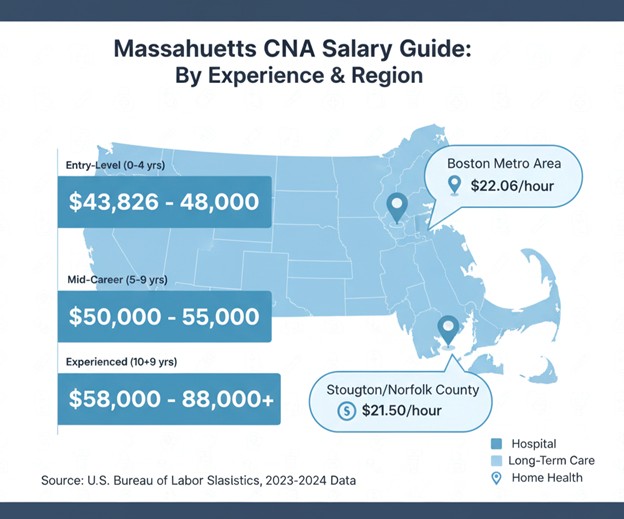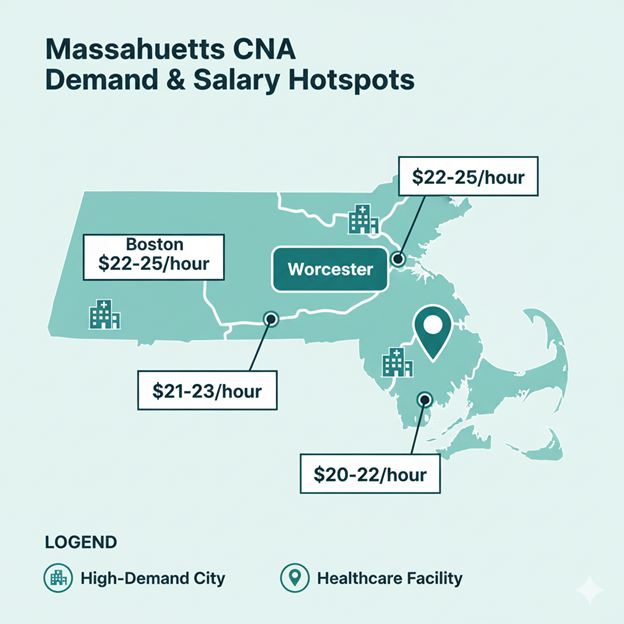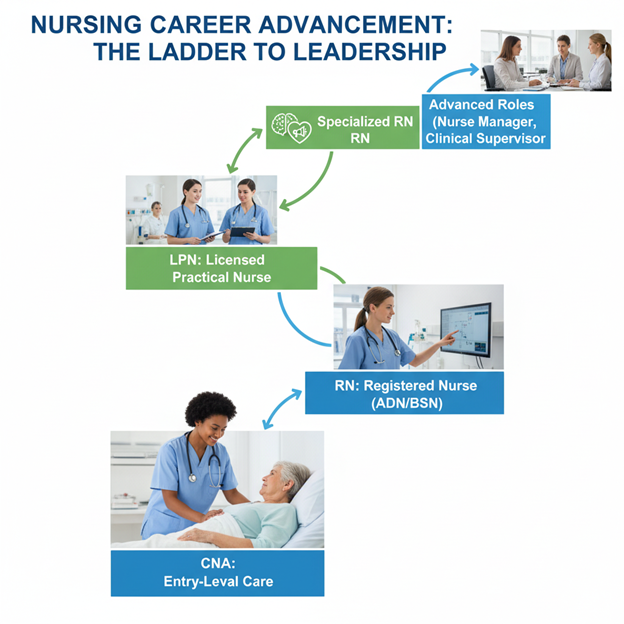Certified Nursing Assistants (CNAs) play a crucial role in the healthcare system, providing essential care to patients in hospitals, nursing homes, and home health settings. With the aging population in Massachusetts, the demand for CNAs is growing rapidly, making this profession an excellent choice for those interested in healthcare.
This article will help new CNAs understand what to expect in terms of salary, job prospects, and career growth after certification. Whether you’re considering becoming a CNA or are already certified, you’ll gain valuable insights into the potential opportunities available to you in Massachusetts.
Statewide Salary Data
According to the latest data from the Bureau of Labor Statistics (BLS) and local industry surveys, CNAs in Massachusetts earn competitive wages. The average salary for CNAs varies depending on experience and location.
Entry-Level CNA (0-4 years):
Hourly Rate: $15.00 – $18.00
Annual Salary: $31,200 – $37,400
Entry-level CNAs generally work in nursing homes or home health care settings and are just starting to build their career in healthcare.
Mid-Career CNA (5-9 years):
Hourly Rate: $18.00 – $22.00
Annual Salary: $37,400 – $45,700
With a few years of experience, CNAs typically have more responsibilities and may work in hospitals or specialized care units, allowing them to earn higher pay.
Experienced CNA (10+ years):
Hourly Rate: $22.00 – $28.00+
Annual Salary: $45,700 – $58,400+
Experienced CNAs may hold senior roles or have specialized skills, which can lead to higher salaries, particularly in specialized care settings like geriatrics or pediatrics.
Regional Salary Variations
Salaries can also vary based on location within Massachusetts. High-demand areas like Boston typically offer higher salaries due to the cost of living and the demand for healthcare professionals.

Hourly Rate: $18.00 – $25.00
Annual Salary: $37,400 – $52,000
Stoughton/Norfolk County:
Hourly Rate: $16.00 – $20.00
Annual Salary: $33,300 – $41,600
While salaries in rural areas like Stoughton may be lower than in larger cities, there are still plenty of opportunities to earn competitive pay, especially in long-term care facilities.
Enhancement: Overtime and Premium Pay
Many CNAs in Massachusetts can boost their income through overtime pay. Working over 40 hours per week or on weekends, holidays, or night shifts often qualifies CNAs for premium pay (typically 1.5x their base hourly rate).
For example, a CNA working overtime may earn an additional $5,000 – $8,000 per year, depending on their schedule.
Healthcare Setting Impact
The healthcare setting where you work can significantly impact your earning potential.
Hospitals: Hospitals generally offer the highest pay for CNAs due to the acute care setting and the complexity of the work. CNAs in hospitals often earn more due to the increased responsibility and patient volume.
Long-Term Care/Skilled Nursing Facilities: CNAs working in nursing homes and skilled nursing facilities may earn slightly less, but these positions offer stability and consistent hours. They also provide the opportunity to develop long-term relationships with patients.
Home Health: Working as a home health aide offers flexibility, allowing CNAs to work with patients in their homes. However, these roles tend to have lower hourly wages than hospital settings. Many CNAs enjoy the autonomy and flexible schedule that home health work provides.
Enhancement: Unionization Effect
In Massachusetts, some CNAs work in unionized facilities, such as Massachusetts General Hospital or Skilled Nursing Facilities. Unionization can lead to:
Higher wages: Many unionized CNAs earn significantly more than their non-union counterparts.
Better benefits: These include healthcare, retirement plans, paid time off, and job security.
More stable contracts: Unions help secure contracts that ensure fair wages and working conditions.

CNAs can boost their earning potential by pursuing quick certifications that don’t require a full degree. Examples include:
Patient Care Technician (PCT): CNAs can complete a short certification program to become a PCT, which can increase their hourly rate by $2 to $5 per hour.
Certified Restorative Aide (CRA): A CRA certification enables CNAs to assist with restorative care for patients, increasing their pay by $2 to $3 per hour.
By gaining these certifications, CNAs can increase their value in the job market without needing to complete another degree.

Demand Statistics
The demand for CNAs in Massachusetts is strong, and this trend is expected to continue as the baby boomer generation ages and requires more healthcare services. According to the Bureau of Labor Statistics (BLS):
The employment of nursing assistants is projected to grow by 8% from 2019 to 2029, faster than the average for all occupations.
This demand is particularly strong in areas like geriatrics, post-acute care, and home healthcare, where CNAs provide essential daily support to patients.
Top Industries Hiring
Post-Acute Care: As the population ages, there is a growing need for CNAs in post-acute care settings, such as rehabilitation centers.
Geriatrics: CNAs specializing in geriatrics are in high demand due to the increasing elderly population in Massachusetts. CNAs with experience in long-term care and elder care often find higher-paying roles.
Enhancement: Incentives and Bonuses
In addition to salary, employers in Massachusetts are offering sign-on bonuses for CNAs to help attract qualified workers in high-demand regions. These bonuses can range from $500 to $5,000 for full-time roles. Some employers also offer tuition reimbursement to help CNAs pursue further education, such as becoming an LPN or RN.
Employment Trends
The healthcare industry is considered recession-proof, with a stable demand for CNAs regardless of the economic environment. As a result, many CNAs enjoy job security and stable income.
The Traditional Bridge: CNA to LPN or RN
Becoming a Licensed Practical Nurse (LPN) or Registered Nurse (RN) is a natural career progression for many CNAs. CNAs interested in advancing their careers can pursue additional education, such as:
CNA to LPN: LPNs typically earn higher salaries and have more responsibilities, including administering medications and overseeing patient care.

CNA to RN: Registered Nurses earn significantly more and have broader roles in patient care, including diagnostic procedures, developing care plans, and supervising CNAs and other healthcare workers.
Educational Resources
There are several ways for CNAs to further their education:
Employer-sponsored programs: Many Massachusetts healthcare employers offer tuition reimbursement programs for CNAs who wish to become LPNs or RNs.
Online and Local Programs: CNAs can also pursue online programs or attend community colleges for accelerated LPN and RN programs.
Enhancement: Recertification/Maintaining Status
In Massachusetts, CNAs must meet specific requirements to maintain their certification:
Work requirements: CNAs must complete a minimum number of hours of work over a set period.
Continuing education: CNAs are also required to take continuing education courses to ensure they are up-to-date with the latest medical practices and patient care techniques.

The demand for Certified Nursing Assistants (CNAs) in Massachusetts continues to grow, offering excellent earning potential and job stability. Whether you’re starting your career as a CNA or considering advancing to roles like LPN or RN, there are plenty of opportunities for growth and professional development.
To get started on the right foot, explore the CNA Training in Stoughton, MA program. It provides a solid foundation to kickstart your career in healthcare and offers hands-on training with experienced professionals.


Explore CNA Training in Stoughton, MA and start your career in healthcare today!
This detailed content provides a comprehensive overview of CNA salaries, career growth, and the job outlook in Massachusetts. It not only answers potential questions from your audience but also leads them to take action, exploring your CNA Training Program in Stoughton.
Let me know if you’d like to refine this content further or add anything else!

Jocelyne Destine provides high-quality healthcare training programs, including CNA, HHA, BLS, and MAP courses. With a focus on practical learning and flexible options, we prepare students for rewarding careers in healthcare. Join us to unlock your potential and make a difference.
© 2024 One Health Training Center and Beyond